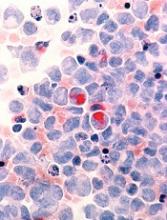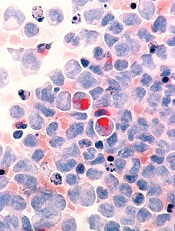User login
The Japanese Ministry of Health, Labour and Welfare (MHLW) has approved the FLT3 inhibitor gilteritinib (Xospata®) to treat patients with FLT3-positive relapsed or refractory acute myeloid leukemia (AML).
Gilteritinib is available in 40 mg tablets. The usual recommended starting dose of gilteritinib for an adult is 120 mg once daily.
The dosage may be adjusted depending on the patient’s condition. However, the daily maximum dose should be 200 mg.
Gilteritinib has demonstrated inhibitory activity against FLT3 internal tandem duplication and FLT tyrosine kinase domain mutation. These two mutations are present in approximately one-third of AML patients.
The MHLW approval of gilteritinib is based on interim results from the phase 3 ADMIRAL study (NCT02421939).
ADIMRAL is designed to compare gilteritinib to salvage chemotherapy in adults who have AML with FLT3 mutations and have relapsed after or are refractory to frontline therapy.
Patients are randomized in a 2:1 ratio to receive gilteritinib (120 mg) or salvage chemotherapy, which may consist of low-dose cytarabine, azacitidine, MEC (mitoxantrone, etoposide, and cytarabine), or FLAG-IDA (fludarabine, cytarabine, and granulocyte colony-stimulating factor [G-CSF] with idarubicin).
Results from this trial have not yet been presented or published. However, a description of the trial was presented at the 2018 ASCO Annual Meeting (abstract TPS7075).
Results from a phase 1/2 study of gilteritinib in AML were published in The Lancet Oncology in 2017.
Orphan and SAKIGAKE designations
The MHLW previously granted SAKIGAKE designation and orphan drug designation to gilteritinib.
To receive orphan designation, a product (drug or medical device) must be intended for use in less than 50,000 patients in Japan. Furthermore, orphan products must be indicated for the treatment of serious diseases for which there are high medical needs.
Companies granted orphan designation can receive preferential tax treatment as well as subsidies through the National Institute of Biomedical Innovation (NIBIO) to reduce the financial burden of product development.
Companies with orphan designation can also receive guidance and consultation from the MHLW, the Pharmaceuticals and Medical Devices Agency (PMDA), and NIBIO on research and development activities.
Orphan designation also allows for priority review and an extension of the re-examination period—up to 10 years for drugs and up to 7 years for medical devices.
SAKIGAKE designation can shorten the review period for a product via prioritized consultation, substantial pre-application consultation, and prioritized review.
SAKIGAKE designation also helps promote development with the review partner system (to be conducted by the PMDA) and “substantial” post-marketing safety measures.
The Japanese Ministry of Health, Labour and Welfare (MHLW) has approved the FLT3 inhibitor gilteritinib (Xospata®) to treat patients with FLT3-positive relapsed or refractory acute myeloid leukemia (AML).
Gilteritinib is available in 40 mg tablets. The usual recommended starting dose of gilteritinib for an adult is 120 mg once daily.
The dosage may be adjusted depending on the patient’s condition. However, the daily maximum dose should be 200 mg.
Gilteritinib has demonstrated inhibitory activity against FLT3 internal tandem duplication and FLT tyrosine kinase domain mutation. These two mutations are present in approximately one-third of AML patients.
The MHLW approval of gilteritinib is based on interim results from the phase 3 ADMIRAL study (NCT02421939).
ADIMRAL is designed to compare gilteritinib to salvage chemotherapy in adults who have AML with FLT3 mutations and have relapsed after or are refractory to frontline therapy.
Patients are randomized in a 2:1 ratio to receive gilteritinib (120 mg) or salvage chemotherapy, which may consist of low-dose cytarabine, azacitidine, MEC (mitoxantrone, etoposide, and cytarabine), or FLAG-IDA (fludarabine, cytarabine, and granulocyte colony-stimulating factor [G-CSF] with idarubicin).
Results from this trial have not yet been presented or published. However, a description of the trial was presented at the 2018 ASCO Annual Meeting (abstract TPS7075).
Results from a phase 1/2 study of gilteritinib in AML were published in The Lancet Oncology in 2017.
Orphan and SAKIGAKE designations
The MHLW previously granted SAKIGAKE designation and orphan drug designation to gilteritinib.
To receive orphan designation, a product (drug or medical device) must be intended for use in less than 50,000 patients in Japan. Furthermore, orphan products must be indicated for the treatment of serious diseases for which there are high medical needs.
Companies granted orphan designation can receive preferential tax treatment as well as subsidies through the National Institute of Biomedical Innovation (NIBIO) to reduce the financial burden of product development.
Companies with orphan designation can also receive guidance and consultation from the MHLW, the Pharmaceuticals and Medical Devices Agency (PMDA), and NIBIO on research and development activities.
Orphan designation also allows for priority review and an extension of the re-examination period—up to 10 years for drugs and up to 7 years for medical devices.
SAKIGAKE designation can shorten the review period for a product via prioritized consultation, substantial pre-application consultation, and prioritized review.
SAKIGAKE designation also helps promote development with the review partner system (to be conducted by the PMDA) and “substantial” post-marketing safety measures.
The Japanese Ministry of Health, Labour and Welfare (MHLW) has approved the FLT3 inhibitor gilteritinib (Xospata®) to treat patients with FLT3-positive relapsed or refractory acute myeloid leukemia (AML).
Gilteritinib is available in 40 mg tablets. The usual recommended starting dose of gilteritinib for an adult is 120 mg once daily.
The dosage may be adjusted depending on the patient’s condition. However, the daily maximum dose should be 200 mg.
Gilteritinib has demonstrated inhibitory activity against FLT3 internal tandem duplication and FLT tyrosine kinase domain mutation. These two mutations are present in approximately one-third of AML patients.
The MHLW approval of gilteritinib is based on interim results from the phase 3 ADMIRAL study (NCT02421939).
ADIMRAL is designed to compare gilteritinib to salvage chemotherapy in adults who have AML with FLT3 mutations and have relapsed after or are refractory to frontline therapy.
Patients are randomized in a 2:1 ratio to receive gilteritinib (120 mg) or salvage chemotherapy, which may consist of low-dose cytarabine, azacitidine, MEC (mitoxantrone, etoposide, and cytarabine), or FLAG-IDA (fludarabine, cytarabine, and granulocyte colony-stimulating factor [G-CSF] with idarubicin).
Results from this trial have not yet been presented or published. However, a description of the trial was presented at the 2018 ASCO Annual Meeting (abstract TPS7075).
Results from a phase 1/2 study of gilteritinib in AML were published in The Lancet Oncology in 2017.
Orphan and SAKIGAKE designations
The MHLW previously granted SAKIGAKE designation and orphan drug designation to gilteritinib.
To receive orphan designation, a product (drug or medical device) must be intended for use in less than 50,000 patients in Japan. Furthermore, orphan products must be indicated for the treatment of serious diseases for which there are high medical needs.
Companies granted orphan designation can receive preferential tax treatment as well as subsidies through the National Institute of Biomedical Innovation (NIBIO) to reduce the financial burden of product development.
Companies with orphan designation can also receive guidance and consultation from the MHLW, the Pharmaceuticals and Medical Devices Agency (PMDA), and NIBIO on research and development activities.
Orphan designation also allows for priority review and an extension of the re-examination period—up to 10 years for drugs and up to 7 years for medical devices.
SAKIGAKE designation can shorten the review period for a product via prioritized consultation, substantial pre-application consultation, and prioritized review.
SAKIGAKE designation also helps promote development with the review partner system (to be conducted by the PMDA) and “substantial” post-marketing safety measures.

